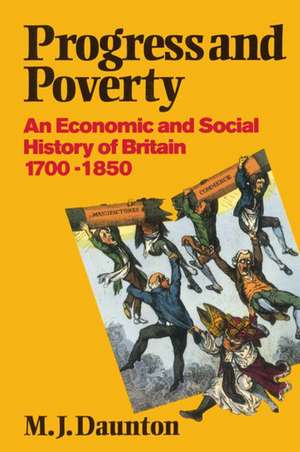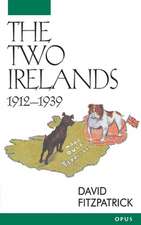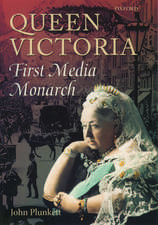Progress and Poverty: An Economic and Social History of Britain 1700-1850
M. J. Dauntonen Limba Engleză Paperback – iun 1995
Preț: 379.35 lei
Preț vechi: 437.34 lei
-13% Nou
Puncte Express: 569
Preț estimativ în valută:
72.60€ • 75.51$ • 60.76£
72.60€ • 75.51$ • 60.76£
Carte tipărită la comandă
Livrare economică 04-10 martie
Preluare comenzi: 021 569.72.76
Specificații
ISBN-13: 9780198222811
ISBN-10: 0198222815
Pagini: 638
Ilustrații: line figures, maps, tables
Dimensiuni: 156 x 234 x 34 mm
Greutate: 0.96 kg
Ediția:New.
Editura: OUP OXFORD
Colecția OUP Oxford
Locul publicării:Oxford, United Kingdom
ISBN-10: 0198222815
Pagini: 638
Ilustrații: line figures, maps, tables
Dimensiuni: 156 x 234 x 34 mm
Greutate: 0.96 kg
Ediția:New.
Editura: OUP OXFORD
Colecția OUP Oxford
Locul publicării:Oxford, United Kingdom
Recenzii
Superb and wide-ranging survey of a fast changing field. Dr C. J. Schmitz, Lecturer in Modern History, University of St. Andrew's
a timely and largely successful attempt to rehumanize modern British economic history by reintegrating it with its social and political cousins...Daunton's integrative approach is most valuable...style is lucid and lively, and his explanations of even the most arcane institutions and concepts are models of clarity...Postgraduates and specialists should relish both its ambitious scope and its fine tuning.
This is a lot of book for the money. Well over 600 pages for less than £15 is good value. It is not only volume that one is purchasing but also a quality product. It combines an excellent synthesis of the most recent work on the classic industrial revolution period with the author's own perceptive insights and interconnections...Each chapter is simply and clearly written, making it very accessible to students as well as more widely read scholars, and yet each contains a sophisticated analysis drawing on economic concepts and terms and spelling out mechanisms by which economic relationships occured. Daunton is excellent at explaining complicated issues...the book is greatly to be welcomed. It will be a great boon to students and a good read for scholars. I look forward to volume II
Daunton has written a work of grand synthesis and sustained argument, which will be read and reread by professionals and students alike. The book is well produced, with convenient notes and excellent bibliographies, and is a signal achievement not least because its author has rescued so many important findings from highly technical studies and made them part of a story told in lucid, attractive prose. Both admirers and critics will want a sequel.
a timely and largely successful attempt to rehumanize modern British economic history by reintegrating it with its social and political cousins...Daunton's integrative approach is most valuable...style is lucid and lively, and his explanations of even the most arcane institutions and concepts are models of clarity...Postgraduates and specialists should relish both its ambitious scope and its fine tuning.
This is a lot of book for the money. Well over 600 pages for less than £15 is good value. It is not only volume that one is purchasing but also a quality product. It combines an excellent synthesis of the most recent work on the classic industrial revolution period with the author's own perceptive insights and interconnections...Each chapter is simply and clearly written, making it very accessible to students as well as more widely read scholars, and yet each contains a sophisticated analysis drawing on economic concepts and terms and spelling out mechanisms by which economic relationships occured. Daunton is excellent at explaining complicated issues...the book is greatly to be welcomed. It will be a great boon to students and a good read for scholars. I look forward to volume II
Daunton has written a work of grand synthesis and sustained argument, which will be read and reread by professionals and students alike. The book is well produced, with convenient notes and excellent bibliographies, and is a signal achievement not least because its author has rescued so many important findings from highly technical studies and made them part of a story told in lucid, attractive prose. Both admirers and critics will want a sequel.
Notă biografică
Amongst Daunton's previous publications are: Housing the Workers: A Comparative Perspective 1850-1914 (editor, Leciester UP, 1989), A Property-owning Democracy? Housing in Britain (Faber, 1987), House and Home in Victorian City, 1850-1914 (Edward Arnold, 1984), and Councillors and Tenants (Leicester UP, 1983)















